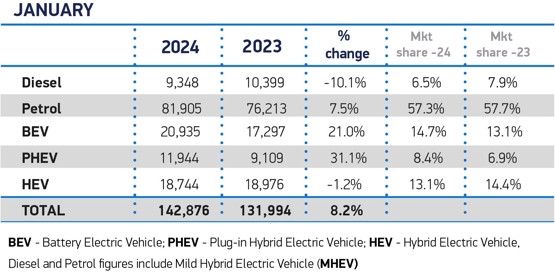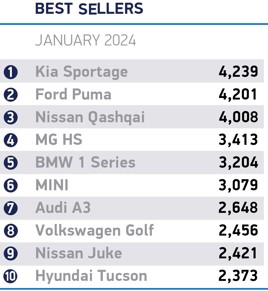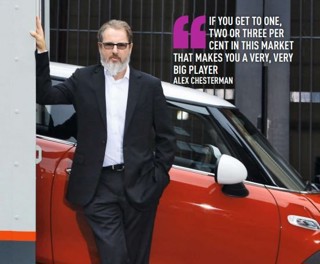Fleet and business orders accounted for almost two in every three new car registrations in January, when the month's market ended at its highest level since 2020.
Of the 142,876 new cars sold in January, which was 8.2% up on January 2023, 35% were to private motorists. In fact private registrations were down almost 16% year on year at 50,244 units.
Volkswagen, BMW and Kia occupied the three podium places in terms of sales volume, although VW's result was almost 8% down on January 2023.
During the month 20,935 battery electric cars (BEVs) were registered, which was 21% up year on year, and the share of the market taken by BEVs reached 14.7%.
Plug-in hybrids (PHEVs) recorded volume growth of 31.1% to take 8.4% of the market, while hybrid (HEV) volumes fell -1.2% with a 13.1% share.
 The SMMT has highlighted that private demand for electric cars has dropped and warns this is an ongoing trend that will undermine the UK's ability to deliver net zero emissions.
The SMMT has highlighted that private demand for electric cars has dropped and warns this is an ongoing trend that will undermine the UK's ability to deliver net zero emissions.
Ahead of next month’s Budget from the Chancellor of the Exchequer, the SMMT is lobbying for government support temporarily halving VAT on new BEV purchases to make electric cars more affordable and attractive for private motorists.
It says such a step would cost the Treasury an average of just £1,125 per car, and would put more than a quarter of a million electric cars on the road by the end of 2026, on top of those already expected. Not only would this cut CO2 by more than five million tonnes during that time, it would mean that the next million EVs could be delivered in just two years. 
“It’s taken just over 20 years to reach our million EV milestone – but with the right policies, we can double down on that success in just another two," said Mike Hawes, SMMT chief executive.
"Market growth is currently dependent on businesses and fleets. Government must therefore use the upcoming Budget to support private EV buyers, temporarily halving VAT to cut carbon, drive economic growth and help everyone make the switch. 
"Manufacturers have been asked to supply the vehicles, we now ask government to help consumers buy the vehicles on which net zero depends.”
Sue Robinson, National Franchised Dealers Association chief executive, said: “Despite the positive start to the year, it is important that the Government continues to support the automotive industry during the transition to zero emissions by investing in charging infrastructure and provide for financial incentives for EV buyers. These issues have been highlighted to the Government in NFDA’s 2024 Spring Budget submission.
“In NFDA’s 2024 outlook survey the top three most prevalent reasons given by dealerships as to why customers are not considering purchasing an EV include range (82%), anxiety around lack of chargers (82%) and cost (80%).
“2024 looks set to be an important year for the automotive industry, and we are confident that automotive retailers will continue to show their robustness through these challenging times.”






















Login to comment
Comments
No comments have been made yet.